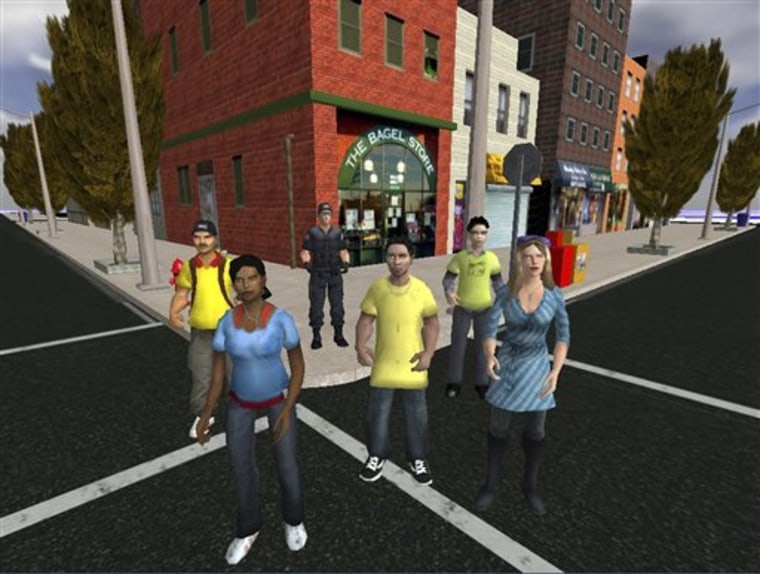A Japanese computer science student fails to take a full load of university classes and loses his student visa. A 10th-grade Indian girl is detained because of a high school essay she wrote on the Department of Homeland Security. These are two of the characters in "ICED!" — a new video game that invites players to step into the shoes of foreigners who run afoul of the U.S. immigration system.
It is part of a burgeoning genre of video games that examine major social and policy issues such as the Palestinian-Israeli conflict, the situation in Darfur and the Electoral College.
"The game allows you to get into the body of a person, so you can experience what they are going through. There are very few opportunities to get that perspective," said Mallika Dutt, head of the nonprofit Breakthrough, which produced the game and uses new media to highlight social issues around the world.
"ICED!" — a play on the acronym for the Department of Homeland Security's Immigration and Customs Enforcement office — is scheduled to be available for free download next month. It differs greatly from games like "Border Patrol," which popped up on the Internet last year and exhorted players to kill illegal immigrants as they entered the country.
"ICED!" seeks to show how immigration laws passed in 1996 expanded the number of crimes that can trigger deportation and limited immigrants' rights to appeal.
Players try to avoid deportation by keeping a low profile and performing community service. Shoplifting or jumping a subway turnstile loses points. Lose too many, and your character ends up in a federal detention facility.
"You can get a lot out of a game, more than from film and other media in some ways, because you are actively engaged rather than just a passive consumer," said Suzanne Seggerman, head of the nonprofit group Games for Change.
Barbara Gonzalez, a spokeswoman for ICE, said the agency was confident players would recognize the game is fiction.
"ICED!" gamers can become a Mexican high school graduate whose family overstayed its visa, or a Haitian war veteran who faces deportation when he turns to alcohol and crime after returning from Iraq.
In the first level, players keep a low profile in a city vaguely resembling New York. In the second level, they must navigate an immigration detention center. Programmer Heidi Boisvert estimates the game can take 10 to 30 minutes to play.
Boisvert and Natalia Rodriguez came up with the idea in graduate school and approached Breakthrough about helping them develop it. Boisvert said they didn't talk to immigration authorities, but they did speak to immigration experts, attorneys and advocacy groups, as well as their target audience of voting-age teens.
All of the characters they chose were based on real situations, including the case of a 16-year-old New York girl from Guinea who was accused of planning a suicide bombing and detained for six weeks in 2005 before the charges dropped.
Steven Camarota, head of research at the Washington-based Center for Immigration Studies, questioned the value of a game that focuses on individual cases rather than the complex issues surrounding immigration. While the U.S. immigration system is flawed, it is also one of the most generous in the world, said Camarota, whose organization favors strict enforcement of current laws.
"Any reasonable person should say your immigration system should always be tempered with mercy and justice," he said. "But it's like anything else. What exactly do you gain by looking at a small aspect of the debate?"
Louis DeSipio, a University of California, Irvine, political science professor and immigration expert, believes players do gain something.
"It's very important, especially for younger people, to understand the diversity of American society. It's easy to assume that everyone is like you," he said. "A game like this can show that."
But unless they want to preach solely to the converted, such games need widespread distribution — something most nonprofits like Breakthrough lack the resources to do — and to be part of a larger outreach campaign, he added.
That was the thinking of "PeaceMaker" creator Asi Burak, whose game allows players to act as both Israeli and Palestinian leaders as they seek to diffuse tension in the Middle East. It is one of the few such games to be sold commercially, including on Amazon.com. Burak claims it has sold thousands of copies in 60 countries at $20 per download.
Burak said he conceived "PeaceMaker" as a way to promote empathy between the two sides. To his surprise, those who played were more excited about finally understanding the broader Israeli-Palestinian conflict.
Even if such games can explain political and social issues, they are only effective if they are fun to play, he cautioned.
"It's like a film," he said. "If it's not good, it's going to bore the audience."
